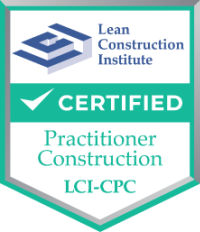Lean Certification FAQs



LCI Candidate Handbook
Answers to most of your questions can be found in the Candidate Handbook. Download it here.
Download NowFrequently Asked Questions
How many years of experience do I need to apply?
Eligible applicants will have 3+ years of deploying Lean construction knowledge on real-life construction projects.
Participation in LCI’s Certification Program is voluntary and open to anyone meeting candidacy requirements at the time of application.
Employer-verified Lean work experience of 3+ years equivalent (2,080 hours per year) will be required at the time of application. Along with two references who can attest to your Lean experience
What is the cost for LCI Certification?
A certification from LCI ranges from $599 for LCI members to $999 for non-members. Bulk Pricing for companies with multiple employees interested in certification is available by contacting certification@leanconstruction.org.
For additional fee information, see the fee schedule in the Candidate Handbook.
What goes into the knowledge assessment exam?
The LCI-CPD and LCI-CPD exams are composed of 3 Domains: Principles, People-Related, and Practices. Additional details about the knowledge assessment can be found in the content outline of each handbook.
What is the capabilities assessment or portfolio review?
LCI’s portfolio review is a capabilities assessment in which candidates provide detailed evidence that they have demonstrated certain competencies of applying Lean on real projects. This is the second part of the certification program and is completed after passing the knowledge assessment. The submitted materials are reviewed in a blind review by a pool of trained subject matter experts to independently evaluate portfolio submissions. Reviewers evaluate submitted responses to the question prompts and artifacts for thoroughness against the subject area definition and requirements using this rubric. See the handbook for additional details.
Who should apply?
LCI Certifications are for anyone who claims expertise in Lean Construction and has 3+ years of implementing and leading Lean Design and Construction projects. This is a chance to show what you know. This includes owners, executives, project managers, designers, architects, foremen, field leaders, project engineers, process managers, and more!
What makes the LCI-CPC and LCI-CPD different from other certifications?
There is nothing like the LCI-CPC and LCI-CPD in the market today. With the increasing demand for professionals with Lean experience, a certification from LCI shows that you not only know Lean principles but can successfully apply them to real-world situations. No other certification in the market does this.
I already have a Lean credential, how is this different?
Other credentials in the market are assessment-based certificates that test a practitioner’s ability to learn through a specific course or other forms of study. These other programs do not assess if a practitioner can deploy Lean on a project. LCI Certifications are unique in that they are an objective measure of a practitioner’s experience implementing Lean on real projects through an exam and portfolio review. While Lean courses can help a practitioner prepare for an LCI Certification, no specific courses are required and completion of any course does not guarantee certification.
How does the LCI Certification benefit the industry?
LCI’s Certifications benefit is a win-win-win for the whole construction industry because it provides an objective standard for someone’s ability to deploy Lean on projects. Increasingly owners are requiring LCI certified practitioners on their team because they know that this helps them identify qualified leaders for their projects. It also helps construction companies demonstrate the Lean experience of their team.




